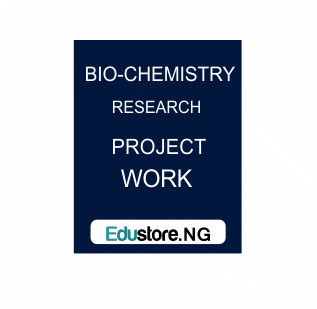Anti Hyperlipidemic Potential Of Vitex Donianaethanolextracts On Poloxamer 407 Induced Hyperlipidemic And Normal Rats
TABLE OF CONTENTS
Title Page
Abstract
Table of Contents
CHAPTER ONE
1.0 INTRODUCTION
1.1 Statement of Research Problem
1.2 Justification
1.3 Aims of the Study
1.3.1 Specific objectives
CHAPTER TWO
2.0 LITERATURE REVIEW
2.1 Vitex Doniana
2.1.1 Habitat/Distribution
2.1.2 Botanical classification
2.1.3 Chemical constituent
2.1.4 Uses
2.2 Polyphenols
2.2.1 Classes
2.2.2 Extraction
2.2.3 Pharmacological action/effect
2.3 Hyperlipidemia
2.3.1 Definition
2.3.2 Classes
2.3.3 Etiology
2.3.4 Diagnosis
2.3.5 Treatment
2.3.6 Experimental model of hyperlipidemia
2.3.7 Hyperlipidemia and liver
2.3.8 Hyperlipidemia and kidney
2.3.9 Hyperlipidemia and hematological parameters
CHAPTER THREE
3.0 MATERIALS AND METHODS
3.1 Materials
3.1.1 Plant materials
3.1.2 Chemicals/Reagents
3.1.3 Equipment
3.1.4 Experimental animals
3.2 Methods
3.2.1 Extraction
3.2.2 Phytochemical screening of the plant
3.2.3 In vitro screening of the extracts
3.2.4 In vivo biological activity of extracts
3.2.5 Quantitative phytochemical analysis of the extract
3.2.6Acute toxicity study
3.2.7 Induction of hyperlipidemia
3.2.8 Animal grouping
3.2.9Collection and preparation of samples
3.2.10 Determination of serum lipid profile
3.2.11 Determination of biochemical parameters
3.2.12 Determination of in vivo antioxidant activity
3.2.13 Statistical analysis
CHAPTER FOUR
4.0 RESULTS
4.1 Phytochemical Screening of VitexDoniana
4.2In Vitro Screening of the Extracts
4.3 In Vivo Biological Activity of Extracts
4.4Quantitative Phytochemical of EthanolicExtract
4.5Lethal Dosage (LD50) of the Ethanolic Extract
4.6Lipid Profile and Atherogenic Predictor Indices
4.7Liver Marker Enzymes and Function Parameters
4.8Kidney Function Parameters and Packed Cell Volume
4.9Body Weight
4.10In Vivo Antioxidant Activity
CHAPTER FIVE
5.0 DISCUSSION
CHAPTER SIX
6.0 SUMMARY, CONCLUSION AND RECOMMENDATION
6.1 Summary
6.2 Conclusion
6.3 Recommendation
REFERENCES
APPENDICES
CHAPTER ONE
1.0 INTRODUCTION
Polyphenols are natural organic chemicals characterized by the presence of large number of phenol structural units (Quideauet al., 2011). The most research-informed and chemistry-aware definition of polyphenol is termed the White–Bate-Smith–Swain– Haslam (WBSSH) definition (Haslam and Cai, 1994) which describes the polyphenol as moderately water-soluble compounds, with molecular weight of 500–4000 Dalton,having more than 12 phenolic hydroxyl groups and with 5–7 aromatic rings per 1000 Da.The number and characteristics of the phenol structures underlie the unique physical, chemical, and biological properties of a particular member of the polyphenol class(Quideau et al., 2011).
DOWNLOAD COMPLETE WORK NOW
View More Bio-chemistry Project Topics
DOWNLOAD COMPLETE WORK- For Reference Only: Materials are for research, citation, and idea generation purposes and not for submission as your original final year project work.
- Avoid Plagiarism: Do not copy or submit this content as your own project. Doing so may result in academic consequences.
- Use as a Framework: This complete project research material should guide the development of your own final year project work.
- Academic Access: This platform is designed to reduce the stress of visiting school libraries by providing easy access to research materials.
- Institutional Support: Tertiary institutions encourage the review of previous academic works such as journals and theses.
- Open Education: The site is maintained through paid subscriptions to continue offering open access educational resources.






